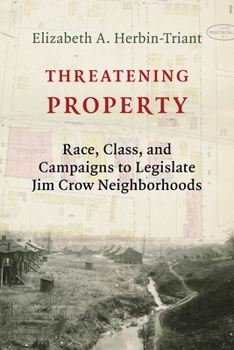Threatening Property: Race, Class, and Campaigns to Legislate Jim Crow Neighborhoods
(Part of the Columbia Studies in the History of U.S. Capitalism Series)
Select Format
Select Condition 
Book Overview
White supremacists determined what African Americans could do and where they could go in the Jim Crow South, but they were less successful in deciding where black people could live because different groups of white supremacists did not agree on the question of residential segregation. In Threatening Property, Elizabeth A. Herbin-Triant investigates early-twentieth-century campaigns for residential segregation laws in North Carolina to show how the version of white supremacy supported by middle-class white people differed from that supported by the elites. Class divides prevented Jim Crow from expanding to the extent that it would require separate neighborhoods for black and white southerners as in apartheid South Africa.
Herbin-Triant details the backlash against the economic successes of African Americans among middle-class whites, who claimed that they wished to protect property values and so campaigned for residential segregation laws both in the city and the countryside, where their actions were modeled on South Africa's Natives Land Act. White elites blocked these efforts, primarily because it was against their financial interest to remove the black workers that they employed in their homes, farms, and factories. Herbin-Triant explores what the split over residential segregation laws reveals about competing versions of white supremacy and about the position of middling whites in a region dominated by elite planters and businessmen. An illuminating work of social and political history, Threatening Property puts class front and center in explaining conflict over the expansion of segregation laws into private property.Format:Paperback
Language:English
ISBN:0231189710
ISBN13:9780231189712
Release Date:May 2019
Publisher:Columbia University Press
Length:352 Pages
Weight:1.10 lbs.
Dimensions:1.0" x 6.0" x 9.0"
Customer Reviews
0 rating





